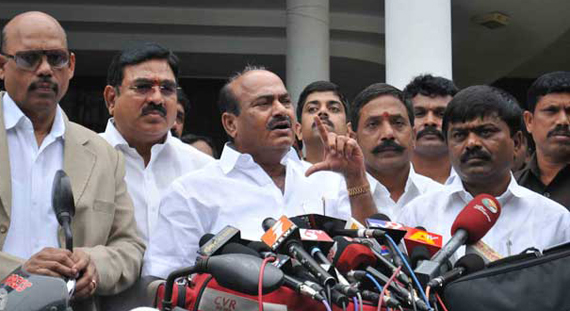
The MPs, who put in their papers, were A Sai Prathap (Rajampet constituency), Anantha Venkatarami Reddy (Anantapur) C V Harsha Kumar (Amalapuram-SC), Vundavalli Arun Kumar (Rajahmundry), Lagadapati Rajagopal (Vijayawada) and S P Y Reddy (Nandyal).
While these MPs tendered their resignations to Lok Sabha Secretary General T K Vishwanathan, the lone Upper House member, KVP Ramachandra Rao, submitted his resignation to Rajya Sabha Secretary General Shamsher K Sheriff.
The MPs said that three more Lok Sabha members from the state -- Sabbam Hari (Anakapalli), Magunta Srinivasulu Reddy (Ongole) and Rayapati Sambasiva Rao (Guntur) -- had also faxed their resignations.
The MPs claimed that central ministers from Andhra Pradesh would meet Congress President Sonia Gandhi and Prime Minister tomorrow and then tender their resignations.
They said they had sought an appointment with Lok Sabha Speaker Meira Kumar as per norms that the Speaker, who has to accept their resignations, has to be satisfied that they had taken the step on their own free will and not under duress.
The resignations came a day after Congress Union Ministers and some MPs from Andhra Pradesh held a meeting at the residence of KVP Ramachandra Rao late last night.
At the meeting, the Union Ministers are understood to have counselled the MPs not to resign saying that after the Congress high-command's decision on Telangana formation, it would focus on Andhra's future development.
However, the MPs felt that the situation has still not gone out of hand and by tendering their resignations, they can force the government to hold back its decision.
Some of them were also of the view that the issue could be raised effectively in Parliament by stalling its proceedings when the Monsoon Session begins from Monday.
An indication that the protest over the decision on separate Telangana is expected to hot up was given by Union Minister Kotla Suryaprakash Reddy, saying that Union Ministers from the Seemandhra region planned to resign.
He said the Ministers have sought appointments with Congress President Sonia Gandhi and Prime Minister Manmohan Singh during which the resignations would be given.
At last night's confabulations at Ramchandra Rao's residence, four of the total eight Union Ministers from Seemanhdra were present. They included M M Pallam Raju, D Purandeshwari, Killi Kruparani and J D Seelam.
S P Y Reddy was not present when his resignation papers were submitted to the Lok Sabha Secretary General. He is out of station.
The MPs, however, said that they have sought an appointment with Lok Sabha Speaker Meira Kumar so as to ensure that the resignation process is duly followed. "We will go through the procedure properly", one of them said.
The action showed that the MPs were especially agitated over the issue of Hyderabad with one of them, Arun Kumar, insisting that all the regions have "equal rights" over the city.
Asked whether the MPs want Hyderabad to be turned into a Union Territory, he avoided a direct reply but said "people at the helm should decide as people of all regions have equal rights over Hyderabad."
He said this was perhaps for the first time that the capital itself was being separated from the original state.
Another MP Rajgopal argued that the union government should not take into account the views of any political party on the issue of Telangana and should go by the Srikrishna Committee report, which, he said, is a "national report."
"TDP, CPI, BJP, Congress may have given their views on the Telangana issue but still Union Government cannot go on the basis of the views of the parties and should go by the Srikrishna report," he said.
The MPs also dismissed the claim that what was being achieved through the decision on separate Telangana was de-merger of the region from Andhra Pradesh. "This is totally untrue. There was never a state called Telangana," Arun Kumar said.
Asked whether there was any possibility of the MPs taking back their resignations, Harsha Kumar said, "There is no question. It is a very painful decision which has been taken in order to reflect the people's opinion."
He also said that the resignations would not be rejected as well because "we have given them in the proper format and addressed to the proper authority."
Arun Kumar told PTI that the Telangana decision was taken "without considering a host of issues", most importantly water because the river Krishna flowed from the Telangana region into Rayalaseema.
Maintaining that Kurnool was the capital when Andhra Pradesh was formed in 1956, he said, "We gave up the capital status in favour of Hyderabad for the sake of a unified state."
He said "all these major issues were not considered at all" which deciding on creating separate Telangana. "We have resigned to protest the decision of our Congress party, my party. The opinion of the people of Andhra and Rayalaseema was not considered."
Arun Kumar also said that every section of people of these regions, including students, lawyers, businessmen and traders, have come out on the streets to protest the decision. "Our duty is to bring this to the notice of the party high command."






Comments
Add new comment